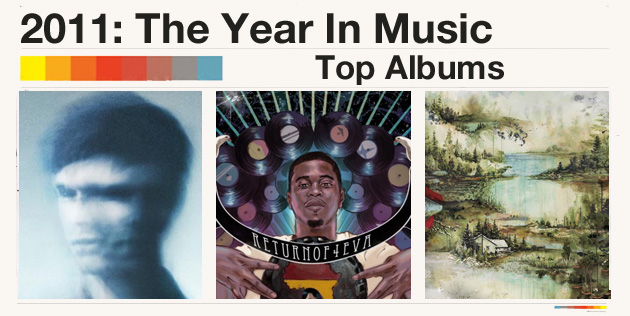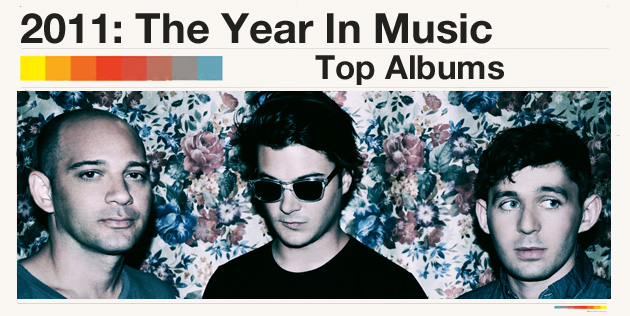Listen to One Thirty BPM’s top albums of 2011 in this Spotify playlist.
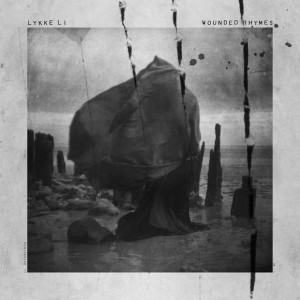
10.
Lykke Li
Wounded Rhymes
[LL]
Lykke Li’s debut album Youth Novels brought to the table a new Swedish alt-pop singer who seemed destined to become a star, particularly with fantastic singles like “Dance Dance Dance” and “Little Bit.” Fast forward a few years and Lykke Li’s not as straightforward as we thought: she smokes, she’s sassy, she’s intelligent and we knew she could sing, but damn she can really sing. Rather than relying solely on current pop tropes to find a hook, Wounded Rhymes finds Lykke delving into great pop of years past; music that was more honest, more heartfelt and more raw. Beneath the multitude of hooks to be found on this album is a whole lot of pain. Sometimes it comes in the form of longing, like in the spare ballad “Unrequited Love,” other times its desperation as in “I Know Places,” or it could be something altogether more complicated as evidenced by “Get Some.” Whether you want to sing, dance, mope or cry Wounded Rhymes has a track that will hit your needs squarely on the head. However, the album is best consumed in one go, giving you the most honest journey through a person’s psyche that you’re going to find in 2011.
– Rob Hakimian

09.
Destroyer
Kaputt
[Merge]
The common thread through all of Dan Bejar’s material as Destroyer is his surreal, but esoterically sensical lyrics (“I sent a message in a bottle to the press / It said, don’t be ashamed or disgusted with yourselves”). How the dude sings them and what the music accompanying his touchy croon might sound like is, admittedly, a different matter. The garage glam of Streethawk: A Seduction is about as far removed as you can get from the romantic and lush smooth jazz found on Kaputt. Reportedly, most of the vocals on Kaputt were sung while Bejar was lounging on his couch. It makes sense. They’re delivered in a sleepy, unconcerned stream of dissembled ideas that compliment the unconsciously exploratory arrangements perfectly. But the secret weapons on Kaputt are the beautifully melodic and improvised saxophone and trumpet flourishes, which arc and weave untethered around the syncopated rhythms and gooey synth plateaus in pastel streaks, building in and out of effortless crests. Kaputt is beautiful, but it’s an everyday beauty – never oppressive or coy or made up – just there, lying in bed next to you with tired eyes and a faded t-shirt, effortlessly beautiful.
– Will Ryan

08.
Real Estate
Days
[Domino]
If there’s one things that this year will be remembered for, other than schizophrenic trip-hop, it’s the flourishing of bands on their second or third album. And Real Estate is no exception, stepping out in 2011 with one of the most impressive and serene albums of the year. Their Reality EP hinted at the sound the band was working towards, and Days fully realizes those ideals, trading in their originally homespun DIY attitude for a more mature and clean sound. So while they aren’t the lovable underdogs anymore, well, they are pretty lovable I guess, Real Estate have taken on an entirely new identity with Days. They are no longer the pet project of second rate local blogs, instead a favorite of NPR, Pitchfork and the like. Whether one of the year’s best tracks, “It’s Real,” was meant to be an open embrace of the band’s now booming popularity or not, what is going on with Real Estate is most certainly real. The band’s arrangements are expansive and gorgeous, exemplified on “Municipality” by a backing choir of voices and guitarist Matt Mondanile’s now unmistakable guitar tone. To me, Days is everything Real Estate wanted to accomplish on their debut but couldn’t, even more than that though, it’s a sign that the best is yet to come from these four talented New Jersey lads.
– Erik Burg
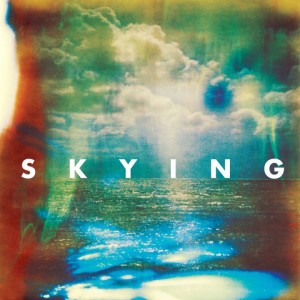
07.
The Horrors
Skying
[XL]
The Horrors’ musical transformation from their 2007 debut album to 2009’s excellent Primary Colours was one of the most surprising in recent musical history. For this year’s Skying they didn’t make another transformation, but rather smoothed over the cracks and brightened up the sound of their sophomore record. Under their own guidance this time, having been let loose by Portishead’s Geoff Barrow who produced their last album, The Horrors seem to have realy grown into their sound. From the horn splashes of “Endless Blue,” to the brutal rockers “I Can See Through You” and “Moving Further Away” and right to the heartbreaking conclusion of “Oceans Burning,” Skying feels like the Londoners’ most complete and well-rounded album to date. None of the songs here can be said to have a great hook, but The Horrors are not looking for radio play with Skying, instead they’ve brought to the table a complete package with an artistic statement that they are a band to be taken seriously, and you’d better start doing so, because they seem like they’re going to be around for a lot longer than any of us would have thought in 2007.
– Rob Hakimian
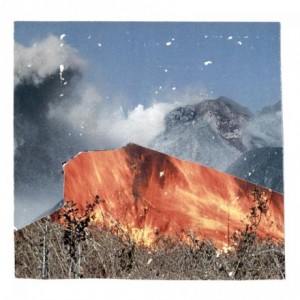
06.
WU LYF
Go Tell Fire To The Mountain
[L Y F]
In an age when we know an artist’s life story before we even hear their music, WU LYF (World Unite! Lucifer Youth Foundation) created intrigue through secrecy, letting their music do the talking before many of us in America had a chance to meet the band. But, as bits started to trickle out about the band, everything we learned about the musicians supported the immediacy and seeming importance of their tunes. Where on record they howl like dogs, their self-release of Go Tell Fire To The Mountain through selling of a membership to the Lucifer Youth Foundation supported this pack mentality. Their songs, four or five minute bursts of tension and release bridged together by Ellery Roberts’ unintelligibly ragged vocals, are perfectly described by the band’s notion of heavy pop, in which they try (and succeed) to capture the scope and energy of post-rock anthems within the confines of pop structure. But, you need not to know any of this to appreciate Go Tell Fire To The Mountain, which, for its pure sensory pleasures, is nothing short of a revelation. Nothing released this year has had such an original and fully-formed idea of who the musicians are and who they want to be, making Go Tell Fire To The Mountain not only a particularly strong debut, but an album that will likely age well as WU LYF continues to grow and expand their popularity.
– Phil Cosores

05.
Shabazz Palaces
Black Up
[Sub Pop]
In 2009, Shabazz Palaces’ smokescreen entrance into the blogosphere conscious was forged via two dizzyingly inventive EPs. As everything settled, many were able to target Ishmael Butler of the jazz rap collective Digable Planets as the Seattle-based act’s point person. The MC’s incantations were enshrined by percussionist Tendai Maraire and engineer Erik Blood. Their light-footed, dissident beats were in stark contrast to big-bodied efforts from ‘90s contemporaries like Raekwon, Mos Def and even DOOM to a point. It was an intriguing, mysterious introduction, but the EPs were easily overshadowed by those heavyweights.
Two years later, the state of hip-hop is stronger than ever; the Watch the Throne duo and the increasingly divisive Drake are raking in millions (or whatever it is, it’s way over our heads), while many upstarts are making their mark: “HiiiPower” Kendrick Lamar, A$AP Rocky, Big K.R.I.T. and Danny Brown to name a few. Plus, let’s not forget the underdogs with great albums this year like Main Attrakionz’ 808s & Dark Grapes II. Many rappers keep slinging new shit almost quarterly, and if you’re Curren$y, most of it is sticking. Nevertheless, one record, Black Up, hovers high above the others and manages to do so in a compact 36-minute, planet-shifting expanse.
Minute details spot the album, collectively making it a brilliant alternative to, oh, everything else: Maraire’s distressing mbira solo and the banshee vocal sample that dominates “An echo from the hosts that profess infinitum,” the slinky rap-singing of THEESatisfaction on “Endeavors for Never,” the deep boom-bap serving as Butler’s launching pad declaration of “tonight!,” which, in turn, cues the soothing female vocals that demand audience participation on “Recollections of the wraith.” Those elements only amount to a very small portion of an album littered with gold specks such as this. Now, please, “clear some space out / so we can space out” a few more times to this album before the year comes to a close.
– Michael Tkach
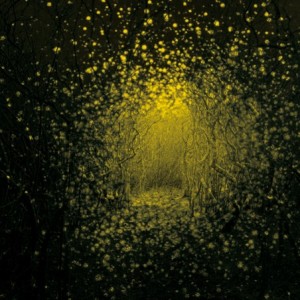
04.
The Antlers
Burst Apart
[Frenchkiss]
While many of us were worried about how The Antlers would follow-up Hospice (our 2009 album of the year), there were few that thought the new release would even be able to hold a candle to their classic sort-of debut. And, well, most of us were wrong. See, Burst Apart is successful in that it never tries to be Hospice, but, rather, completely turns the page and starts fresh as a new project from the band. The bookends of the collection are as straightforward of songwriting as you will ever see from Peter Silberman, using his falsetto on “I Don’t Want Love” to sound like he is dueting with himself, and using extended metaphor of “Putting The Dog To Sleep” to create one of the most brutally gut-punching and emotional moments of the year. Wrapped in between is an album relying more heavily on textures and electronic layers than the crescendos and commitment to the narrative that we had previously seen with The Antlers. But, as dense as “Rolled Together” and “No Windows” can seem, Silberman’s seeming inherent gift of writing accessible melodies keeps Burst Apart from departing too far from why many of us like The Antlers in the first place. Burst Apart is the best kind of follow-up album: one that not only meets any expectations set up for the band, but also creates a whole new realm of possibilities.
– Philip Cosores
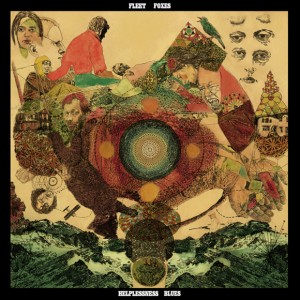
03.
Fleet Foxes
Helplessness Blues
[Sub Pop]
The first word on Fleet Foxes’ follow-up to their massively successful debut came from none other than Robin Pecknold himself. Instead of touting his sophomore release as the masterpiece that it turned out to be, the always modest singer-songwriter described the record as potentially boring. Someone needs to give this man some a booster shot of confidence. Helplessness Blues is many things, but boring is certainly not one of them. Ingenuity bursts from the seams of nearly every track on the album, pushing the band both in directions that seemed probable as well as others that were completely unexpected. Fleet Foxes was an unhurried, delicate, and accessible album on which Pecknold often chose to tell stories rather than to reveal anything truly personal. The band proves with its very first lyric that Helplessness Blues could not be described in a similar fashion. Opening track “Montezuma” begins with “So now that I’m older than my mother and father when they had their daughter, now what does they say about me?” Immediately, Pecknold brings himself into the fold to a much greater extent than he ever did on the debut album. Along with this development is a new level of relatability that comes from his own personal wonderment. When he exclaims “If I know only one thing, it’s that everything that I see of the world outside is so inconceivable often I barely can speak,” the rock-star image fades away and leaves behind what appears to be a mere man. Musically, Helplessness Blues doesn’t stray so far from the debut album so as to upset fans, but far from treading water, the band’s artistic palette is clearly expanded. This can be seen on almost every track, but most notably, on the initially divisive “The Shrine / An Argument.” Pecknold’s voice is rougher here than it has ever sounded before and the piece reads more as some sort of folk evolution of prog-rock that no band this side of The Decemberists has even attempted. Many have viewed this song as a departure for the band, but in truth, it is a logical next step and given the strength of the track in question, it forecasts only bigger and better ideas for the future. With only two albums under their belts, Fleet Foxes have cemented their status as one of the best, most talented, most influential, and most important bands of this generation.
– Ricky Schweitzer
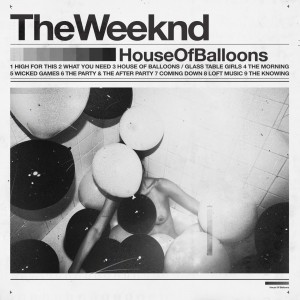
02.
The Weeknd
House of Balloons
[Slef-released]
Mystery surrounded Abel Tesafaye when he released his debut album, House of Balloons (it’s officially classified as a mixtape, but it’s as cohesive and well-sequenced as any album released this year). Nobody knew anything about him, except that he was from Toronto and had the endorsement of rap superstar Drake. And then there was that voice, a devastating falsetto which in and of itself justified the hype. The nine songs on House of Balloons are vignettes of drug-fuelled sex, sex-fuelled drug binges, and all of the regret that is inherent with said, and the shapeshifting R&B tracks are dense and idiosyncratic enough to make him an underground darling but accessible enough to put him in line for what should be a huge major-label payday. House of Balloons peaks with the stunning three-song stretch of “House of Balloons/Glass Table Girls,” “The Morning,” and “Wicked Games,” which are as drenched in regret and contradictions musically as Tesafaye’s tales are.
– Sean Highkin
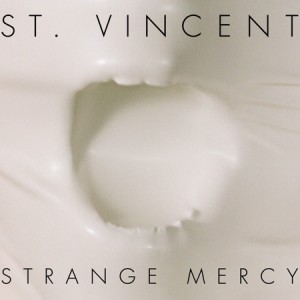
01.
St. Vincent
Strange Mercy
[4AD]
This year’s album of the year could be anybody’s number one, but I bet you it wasn’t yours. This isn’t about laying claim to the onliest flying island of Laputa – would be an apt comparison, though, considering we’re yet another male-dominated online publication comprised of educated, yet flawed, people attempting to mask our deficiencies (and no, handing Annie Clark our fictitious AOTY trophy isn’t an attempt to make amends, either). Strange Mercy is the ubiquitous selection charting high on many year-end lists, also functioning as the conversion point for those that defied all odds and undervalued her previous two efforts. And it’s a monster of an album. The year’s best, to be precise. No ulterior motives on our behalf, no fluff – well, a little bit of fluff.
You see, Annie Clark deserves credit for many things in 2011. Most notably, she provided us with a major holy-shit moment, the year’s most compelling cover, by way of Big Black’s “Kerosene” (along with solidifying her good taste on a slew of others like Tom Waits’ “Big Black Mariah” and the Pop Group’s “She Is Beyond Good and Evil”). We also have her to thank for the most annoying twitter campaign, asking her followers to tweet the hashtag “#strangemercy” to unveil album teasers and debut track “Surgeon.” And this took at least six times longer to accomplish than the shelf life of the best trending topics. Why did we endure such an unreasonable request? As fans, we might not have Bieber-level fever, but we cared enough to be compliant, anyway, and I even turned to poetry referencing the origins of Clark’s stage name: “After the 18th straight whiskey – shrouded in smog, illness & misery – Dylan Thomas was admitted to St. Vincent’s to die poetically. #strangemercy”
On St. Vincent’s third album, however, her lyrics dispense of the sometimes coy direction on Marry Me, which was equally endearing, and begin to lean more on the autobiographical, as she hinted on Actor. At least, we’d like to think that we can intercept hints of her home and road life within the lyrics. During a recent interview, Annie Clark told us her inspiration comes from “anywhere and everywhere. Everything is fodder, nothing is sacred.” Well said, but this statement only reinforces our fear that we are the voyeuristic character in “Dilettante,” when she sings, “you’re like a party I heard through the wall / invite me / but I’m always watching you through a keyhole.” There’s a strange duality present where both the artist and the listener function as the outsider. And the skittish, rabbit-like subject of “Neutered Fruit” isn’t offering any answers.
So, let’s put a halt on dissecting her lyrics like a surgeon, and get to the bulk of what matters: these songs! Where the artist and audience really embrace is, somewhat ironically, in the anxious, claustrophobic depths of Strange Mercy’s production. That black cloud of a guitar, lashing out like bellicose lightning, is a force from the start, but extra dexterous on “Surgeon.” Occasionally, the clouds clear, but even the pervasive strings and keys are deceptively pretty, ready to catch you off-guard. On the title track, Clark’s voice catapults to great heights as the low-end distortion mounts, unhinging what was otherwise the first outright pleasant track on the album. And so the honor for most elegant goes to “Champagne Year,” which fronts a gentle post-industrial pulse like a modern Twin Peaks theme. It all amounts to a terrific package; there are so many ideas packed into one 40-minute album.
Before we finish reflecting on the year’s best and begin to look forward to a promising 2012 – who knows, maybe The Avalanches will release their little unicorn of a sophomore effort and/or Clark will wrap-up her collaborative project with David Byrne – we asked Clark what her favorite album(s) of 2011 were. To bid you adieu, we’ll leave you with her response, which begins in 2011 and ends in 1976: “Oh jeez. I’m usually so behind the times. I think Merrill (tUnE-yArDs) did a great job. I have been listening to a record called Selda by a Turkish artist of the same name. It’s amazing.”
– Michael Tkach

